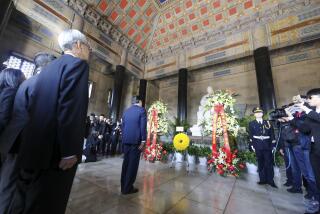Mao’s 100th Birthday Party: A Mixed Affair
- Share via
BEIJING — On the 100th anniversary of Mao Tse-tung’s birth, President Jiang Zemin on Sunday called on the Chinese people to remember the late leader as a national hero who nevertheless made many grave mistakes that the country’s current leadership is still trying to rectify.
Jiang’s nationally televised speech at the Great Hall of the People first praised Mao, then diminished him, casting paramount leader Deng Xiaoping as the man who saved China from Mao’s errors. Deng, 89 years old and believed to be ailing, did not appear in public to acknowledge the anniversary.
All over China on Sunday, events commemorating Mao, who died in 1976, seemed touched by ambivalence toward the man who guided the Chinese revolution but who also launched the country into 10 years of terror during the 1966-76 Cultural Revolution.
One national television network aired scenes from “The Red Detachment of Women” operatic ballet and other patriotic works. Another featured a glitzy two-hour variety show with occasional tearful testimonials from those who fondly remembered China’s “Great Helmsman.”
But most official speeches and statements were tempered by equal parts praise and criticism of the former Chinese leader, who ruled the People’s Republic of China from its creation in 1949 until his death.
The most reverent memorials took place in Shaoshan, in Mao’s native Hunan province, where a 20-foot-high statue of Mao was unveiled recently.
But at Maxim’s, the tony French bistro in one of Beijing’s gleaming new high-rise office complexes, the centennial was turned into a high-camp event for the irreverent arts set and foreign residents. Some of the participants in the Christmas/Mao fete dressed up as Red Guards or as victims of persecution during the Cultural Revolution. A Christmas tree had small Mao photographs as ornaments.
At another club near Beijing University, hundreds of Chinese and foreign students danced to music by the rock groups the Police, the Ramones and the Beatles--mixed in with cuts of the Chinese national anthem and the Maoist hymn “The East Is Red.”
At one point, the disc jockey played the Clash song “Should I Stay or Should I Go?” while flashing Mao’s portrait on the video screen.
In the much more subdued setting of the national Propaganda Department in central Beijing, 500 scholars convened Sunday for a five-day symposium to debate the legacy of Maoist thought.
In a speech at the symposium, Hu Sheng, president of the Chinese Academy of Social Sciences, seemed to capture the official take on Mao in the Deng era.
“Although in the later part of his life Mao Tse-tung experienced many twists and turns and made a grave mistake in launching the Cultural Revolution,” Hu said, “history will not forget his great deeds and his pioneering spirit of exploration.”
In its lead editorial on Sunday, the official Communist Party newspaper People’s Daily invoked the words of Deng from an earlier speech to describe both China’s gains and injuries during the 1949-1976 Maoist era.
“In many respects,” Deng said, “we are doing what Mao Tse-tung put forward but did not do, rectifying what he had wrongly opposed and doing well what he had not done well.”
In a one-hour speech, President Jiang, who also holds the important positions of Communist Party general secretary and chairman of the powerful Military Affairs Committee, pounded on similar themes. Mao’s mistakes, he said at one point, were at least the mistakes of a “great revolutionary.”
Listening impassively behind a row of potted citrus plants were senior members of the Communist Party, including Premier Li Peng, National People’s Congress Chairman Qiao Shi and economic czar Zhu Rongji--all potential pretenders to power in the event Deng dies soon.
Sweating profusely from the exertion of delivering the speech, Jiang rallied the audience to the virtues of both Deng and Mao. The loudest cheering came from army and navy cadets assembled for the rally, who occasionally broke into regimental cheers.
A banner along the balcony of the assembly hall called on the Chinese people to “Support and Develop Mao Tse-tung Thought.”
After the rally of an estimated 10,000 people, the senior leaders and other VIPs visited Mao’s mausoleum in the adjacent Tian An Men Square, site of the 1989 pro-democracy demonstrations.
The general public, including thousands who gathered Sunday on the fringes of the square despite a frigid northerly wind, will not be permitted in the stone mausoleum, where Mao’s body is embalmed in a crystal glass case, until today.
The Chinese leadership still fears the potential of a populist political movement built around Mao, 17 years after his death.
Economic policies under Deng have created yawning disparities in income between urban areas and the rural zones, where Maoism maintains its firmest hold.
“In the countryside,” said American author and Beijing resident William Hinton, “Mao is still revered.”
Times researcher Kevin Platt contributed to this report.
More to Read
Sign up for Essential California
The most important California stories and recommendations in your inbox every morning.
You may occasionally receive promotional content from the Los Angeles Times.













